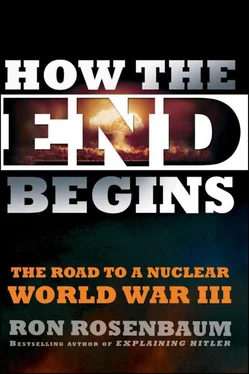THE LARGER SANITY QUESTION
What Schlesinger did—and what Major Hering’s question implied—is more than raise the issue of the sanity of a single president. [66]They raised a larger question: the sanity of the command and control system itself. Think about it: What could Schlesinger do? What could any future secretary of defense do in such a case? Race to the White House and grab the nuclear football out of the president’s hands? (Remember the war room scene in Dr. Strangelove? “GENTLEMEN, you can’t fight in here! This is the War Room!”) Or would we have a situation when the secretary of defense would be on one line ordering the chief of the Strategic Air Command to disobey the orders of his commander-in-chief and not launch his missiles while the president on the other line was telling him to do exactly that? Or perhaps the reverse: the secretary of defense screaming for an immediate launch, the president hesitating.
In theory the president would win such a struggle. The president has the constitutional power to fire the secretary of defense and appoint a compliant subordinate, as Nixon reminded us all in 1973 when he ordered his attorney general to fire Special Prosecutor Archibald Cox and then when the attorney general and his successor both refused, fired them, until he appointed someone compliant, Robert Bork, to do the job. But the outcome of Schlesinger’s jury-rigged solution to the Nixon problem cannot be predicted. Perhaps the SAC commander would side with the fired secretary of defense and they would both seek to have the president declared incapacitated under the 25th Amendment. By then we’d be in coup territory, or inside an episode of 24. And what is sanity or insanity? What if the president refuses to carry out the deterrent threat of genocidal retaliation once it’s failed to deter a strike on us? Can those around him force the president to give them the Gold Codes and in effect give the launch order? Who determines who is sane and who is insane?
After his dismissal from the Air Force, Major Hering took a job as a long haul trucker, so he was hard to find. When I finally reached him two years after he had been let go, he seemed eminently sane. He was soft-spoken and earnest, and not a pacifist or a shirker. He had won a Distinguished Flying Cross for missions over Vietnam. He was willing to twist his launch key—he just wanted to know it was the right thing to do, the right order to follow. My father, a wartime second lieutenant, used to cite the slogan “There’s a right way, a wrong way, and the Army way,” and you do things, right or wrong, the Army way. Major Hering just wanted to believe the Army way was the right way. [67]
When I spoke to him he told me he still believed his question was valid, but he was not obsessed by it, the way I had become by then. He had done his job as an officer sworn to protect and uphold the Constitution. He took the task of asking the question seriously, as part of his duty to his country, and after he had exhausted his appeals, had accepted the consequences and become a trucker. He still is. Yes, he told me, he felt lonely being the only one to stand up and ask the question but he said he had not been alone: other crewmen felt the same doubt; they just kept silent.
Major Hering may have moved on, but the whole question of nuclear command authority, and of who takes control of that authority if the president is killed in a nuclear attack, has frustrated experts and politicians for decades. Yale Law School professor Akhil Reed Amar has called the confusing succession problem “a disaster waiting to happen.” [68]Even before Major Hering came along, Congress passed in 1947 the Presidential Succession Act. But it was full of absurdities. Do you know, for instance, about its “bumping” provision? [69]If a decapitating strike leaves, say, the treasury secretary as the top surviving constitutional successor and he takes the oath of office and begins to act like the president, it is still possible for the secretary of state, who may have been away on a trip to Malaysia when the attack hit, to come back and “bump” that lower-ranking treasury secretary off his perch when she comes home and asserts her claim to the presidency. What if the treasury secretary—now president—objects? Who would decide it? A decimated Supreme Court or a Congress without a quorum? Madness!
As it turns out, Major Hering’s question helped trigger an investigation by the International Security subcommittee of the House Committee on International Affairs in March 1976 into nuclear command and control procedures. The Ottinger Committee, as it was known after its chairman, New York State representative Richard Ottinger, featured University of Maryland professor George Quester as its main witness. [70]Over several days of testimony he made the entire structure of command and control of nuclear weapons look like a house of cards whose orderliness on paper could not survive the first strike that disrupted communications between the president and SAC and between SAC and its bombers and missiles. The hearings were largely ignored and ten years later, the House Government Operations Committee held a subcommittee hearing, featuring the testimony of Bruce Blair, a former missile crewman who had gone on to Yale and the Brookings Institution and written a study of command and control flaws. Blair too had been moved by Major Hering’s question and had started asking questions of his own. Blair told the committee that “American nuclear doctrine has been racing way ahead of” the command and control system, which he said was now “geared for launch on warning.” He said that “because launch on warning is less likely to allow decision makers sufficient time to weigh options rationally, the control system itself has introduced volatility into crisis decision making.” [71]The key point here is that there will not be time to weigh options “rationally.”
In an attempt to bring clarity to the situation, two of Washington’s most venerable think tanks, the Brookings Institution and the American Enterprise Institute, in 2002 jointly formed a commission to consider continuity of government after a catastrophic attack. Suffice it to say that the final report issued in June 2009 doesn’t answer who will be in charge in the aftermath of a decapitating attack. [72]
The report begins with a dramatic section entitled “SCENARIO: CONFUSION.” It posits a strike by a suicide plane on the Capitol during the State of the Union address when the heads of all three branches of government are “decapitated” and “the military informs the Secretary of Agriculture that there is no contact with anyone else in the line of presidential succession.” (One cabinet officer is always stationed in a secure undisclosed location during such occasions.) But, it asks, what if the president is still alive but incapacitated? How exactly would power be transferred to the secretary of agriculture? “The lack of clarity would grow if another higher ranking cabinet member would be found alive after the Secretary of Agriculture took office…. Who would control the nuclear codes if they were needed? Who would be able to launch military action?”
After a hundred or so pages, the commission is raising still more questions and finding no answers. It concludes by saying, “It is the finding of this commission that the current system would be inadequate in the face of a catastrophic attack that would kill or incapacitate multiple individuals in the line of succession. The current system must be corrected to ensure continuity in the executive branch.” This extensive study with its urgent warnings was largely ignored.
To compound the confusion; in April 2007, President Bush issued an executive order (National Security Presidential Directive-51) establishing an incredibly elaborate extra-constitutional “continuity of government commission” that was given authority to make decisions, including nuclear ones. [73]That commission’s authority seemed to trespass on the already disastrously conflicting and cross-wired statutory lines of succession, in that it seemed to allow a whole shadow government to emerge in the event of a crisis and announce, in effect, “No matter what else you’ve heard, we are in charge.”
Читать дальше











